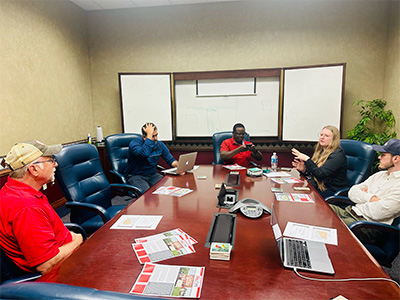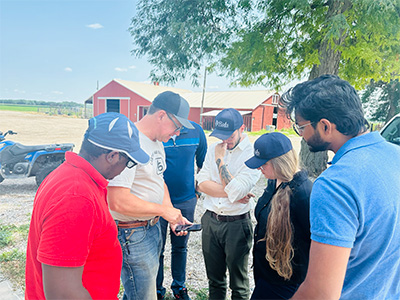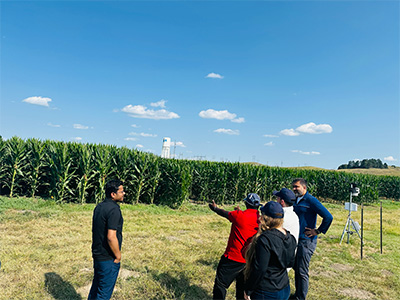Agtech innovations in irrigated agriculture are important for addressing global challenges such as water and food security. The Daugherty Water for Food Global Institute (DWFI) supports agtech solutions in a variety of ways. One of the things we love doing is to showcase Nebraska agriculture to our stakeholders. This helps build collaborations and demonstrate effective agricultural management in the state. I was recently fortunate to tour West Central Nebraska with two international agtech startups: AgInfinity (formerly GramworkX) from India, and Raks Technologies from Brazil. AgInfinity leverages AI to provide crop advisory services and offers a combination of sensors, IoT, and software suites for irrigation needs. Raks Technologies offers affordable soil moisture sensors for irrigation planning and scheduling.
The field trip was a part of the 2024 AgTech Connect conference, an event hosted by Invest Nebraska and its Combine incubator and supported by DWFI. The conference showcases Midwest agtech innovations and fosters connections among agtech investors, startups, and producers. Additionally, by inviting international startups to this platform, the conference promotes the exchange of knowledge and experiences. We organized the field tour to help the startup founders understand Nebraska’s agricultural landscape and agtech adoption potentials by showcasing university resources, facilitating conversations with growers, and discussing partnership opportunities.
Engaging with UNL-TAPS and N-Mobile Irrigation Testing lab program
Agtech startups are increasingly looking for university collaboration to test and validate their products. University validation can add credibility and improve market acceptance of their products. To help the startups understand the resources that UNL could provide to test and validate their technology in Nebraska, we met with the team members of the UNL Testing Ag Performance Solutions (TAPS) program and the N-mobile irrigation testing lab. During this meeting, the startups had the opportunity to present their work and discuss how these university programs could support them.

The UNL-TAPS program operates center pivots on a large portion of farmland and allocates plots within these pivots to host interactive farm management competitions in a controlled, low-risk environment. Participants test various management practices and technologies, with access to extensive data at the end of the year. Through a peer learning process, participants learn about the possibility of reducing input application, improving crop yield, and increasing income. The goal is for growers to understand what technologies or management practices are successful in the UNL-TAPS field and adopt them in their operations. Within the program, agtech companies provide equipment and sensors, leveraging the program to showcase and validate their products and services.
The N-mobile irrigation testing lab program compares different irrigation technologies on growers' fields and university plots to de-risk the technology adoption process for growers. Within this program, growers are provided with technology of their choice which is installed and tested on their farms at no cost to collect the right information. On similar research farms, irrigation system performances are also monitored and evaluated to ensure uniform and right water application depths. The data collected on the grower’s fields helps to complement the work conducted on research plots.
Now, testing innovations in both research trial fields and operational farm settings gives a more granular dataset for evaluating market viability and the rate of adoption, enabling more informed decisions for market entry and product development. AgInfinity and Raks Technologies plan to participate in one of the programs in the next cropping season. Feedback from the university testing and real-world applications can help the startups refine their solutions to better meet the needs of the market.
Meeting with a grower
To give startups a flavor of Nebraska agriculture and provide insights into agtech adoption and the challenges faced by growers, we met with Jeff Huffman from Island Farms. Jeff shared a story about his skepticism about using soil moisture sensor technology and crop advisory apps. In the first two years of sensor installations, he didn't follow any agronomic advice because he found the provided soil moisture graphs difficult to interpret. However, in the third year, the agtech company providing sensors partnered with a local crop consulting company (Crop Tech Solutions). With the support of the local service, Jeff started implementing most of the agronomic recommendations.
Last summer, Jeff ran two fewer circles of a center pivot, applying 20 acre-inches less water compared to the previous year. This resulted in savings of ~ $2000 in energy costs on his 80-acre farm, while also maximizing yield. He applied similar recommendations to another 100-ac field with a similar soil type but without sensors, achieving similar reductions in water and energy use. Jeff’s transition from skepticism to implementing agronomic recommendations and following proper recommendations illustrates the potential for agtech adoption, provided there is adequate communication and support, and demonstratable benefits.

Key learning from our tour
First, the adoption process in agtech takes two things: people and time. For any agtech startup to operate in a new geography, it is important to have a local partner to provide after-sales support and a trusted relationship. The local partner has to understand the technology well, be familiar with the data, know how to interpret it, and turn it into actionable insights. Such personalized support makes it easier for growers to understand and apply the recommendations effectively. While there may be initial skepticism from growers about using ag technology and following agronomic recommendations, this can evolve into trust over time. As we learned from Jeff’s example, when he began following agronomic advice after the second year with support from local partners, it resulted in significant water and energy reductions.
However, one challenge for international startups looking to expand in new geographies is that, despite advancements in technology (even Artificial Intelligence), the human element in agriculture remains important. Growers often rely on relationships with advisors, suppliers, and peers to make decisions.
Second, growers are more confident and willing to adopt new technologies when universities and agtech companies work together with them. Particularly, when university research or extension services provide support in taking the risk of comparing different agricultural technologies and finding the right solution. This support helps growers build confidence in their investment decisions, reducing the risks they face when trying out new technologies on their own.

Looking Ahead
The startups enjoyed learning about Nebraska agriculture, challenges in agtech, and partnership opportunities that could drive their innovations forward and potentially help them expand their operations in the US market. Again, I was fortunate to accompany the startup founders on this tour and facilitate this sort of global networking to support the agtech ecosystem. If you are an agtech startup working to address water and food security, we would be happy to host you if you ever find yourself in town.
I’d like to thank Chuck Burr and Abia Katimbo from West Central Research and Extension Center and Jeff Huffman from Island Farms for their time and insights.


